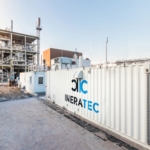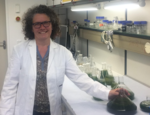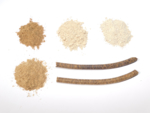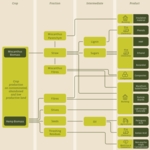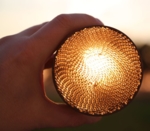-
Dossier - 28/04/2020
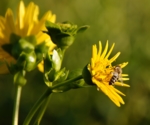
Biomass from forestry and agriculture along with residues from industry and households can contribute to our energy and raw material shift. Sustainable, regenerative biomass-based energy can become part of the energy mix of the future within the framework of a bioeconomy.
https://www.biooekonomie-bw.de/en/articles/news/Sustainable-bioenergy
-
Urban agriculture - 23/04/2020
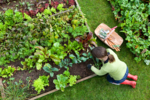
Given the challenges faced by modern agriculture, it is vital to raise people’s awareness of how to change their approach to food. The founders of the Stuttgart-based start-up company farmee GmbH see urban agriculture as the key to making this change possible. The company has developed “alphabeet”, an app designed to encourage consumers to produce their own food. After all, only those combining knowledge and practical experience can be expected…
https://www.biooekonomie-bw.de/en/articles/news/alphabeet-the-green-fingered-smartphone
-
Biosensors - 09/04/2020
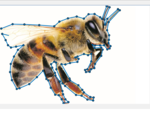
Sensor networks are one of the keys to achieving digitalisation of the bioeconomy. Sensor networks are on the way to becoming important analysis and control instruments for energy-efficient and sustainable material cycles. Dieter Hertweck, Professor of Business Information Systems at Reutlingen University of Applied Sciences, shows what is already possible in digital agriculture and waste recycling and what is feasible for the future.
https://www.biooekonomie-bw.de/en/articles/news/Sensors-for-the-bioeconomy
-
-
Biogas and wood as components of the energy transition - 10/02/2020
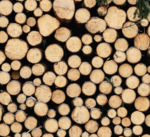
Decentralised, controllable and stable - renewable energy is an important component in the transition to a bioeconomy without fossil fuels. BIOPRO spoke to PD Dr. Andreas Lemmer from the State Institute of Agricultural Engineering and Bioenergy at the University of Hohenheim and Prof. Dr. Stefan Pelz, scientific director of the Institute for Applied Research and professorat the University of Applied Forest Sciences Rottenburg.
https://www.biooekonomie-bw.de/en/articles/news/New-perspectives-for-bioenergy
-
Polysecure GmbH - 16/01/2020
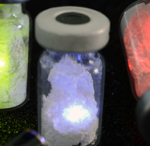
Plastics are harmful to the climate and human health both during manufacture and combustion and they also clutter our planet with garbage. Recycling is therefore a key issue, but it is not efficient. Polysecure has developed a process for permanently marking individual plastics that enables them to be separated efficiently and returned to a circular economy. This would counteract the vast amount of (micro) plastics and reduce CO₂ emissions.
https://www.biooekonomie-bw.de/en/articles/recycling-of-the-future-marked-plastic-as-a-circular-product
-
Producing valuable new products from waste materials - 07/01/2020
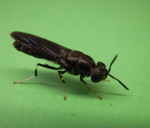
Eco-friendly and responsibly manufactured products are more in demand than ever before. Specific research is being carried out into materials and applications for a wide variety of uses. The Fraunhofer Institute for Interfacial Engineering and Biotechnology IGB is working with Hermetia Baruth GmbH on the vision of an insect biofactory that uses waste materials to produce a wide range of products such as biosurfactants, animal feed or foils.
https://www.biooekonomie-bw.de/en/articles/news/A-vision-insect-biorefineries-as-components-of-a-sustainable-bioeconomy
-
EIP-AGRI project coordination - 12/12/2019
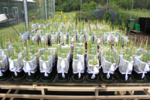
Lentil plants, rarely cultivated in Central Europe in the twentieth century, are making a comeback. The "Rhizo-Linse"1 EIP-AGRI project aims to reintroduce old lentil varieties and make them appealing to farmers. A company called nadicom Gesellschaft für angewandte Mikrobiologie mbH is working on the development of an ecological product consisting of nodule bacteria that can improve lentil plant growth.
https://www.biooekonomie-bw.de/en/articles/news/nadicom-Rhizo-Linse-project-excellent-small-fertiliser-factories
-
Biosensors - 03/12/2019
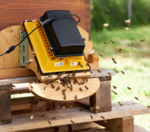
Biosensors are used in medical diagnostics and food and environmental analyses, to name just a few examples. apic.ai, a start-up based in Karlsruhe, uses honey bees as bioindicators to gain insights into the state of the ecosystem. The company also uses artificial intelligence (AI) methods for their ecotoxicological investigations.
https://www.biooekonomie-bw.de/en/articles/news/learning-from-the-bees
-
CRISPR/Cas9 and genetic engineering laws - 27/11/2019
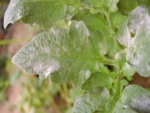
Plant geneticists from Tübingen have used genome deletion to breed a variety of tomato that is resistant to powdery mildew. The CRISPR/Cas9 technology that they used enabled them to achieve this in a relatively short period of time. They also demonstrated beyond any doubt that the new tomato variety contains no foreign DNA and is indistinguishable from naturally occurring deletion mutants.
https://www.biooekonomie-bw.de/en/articles/news/transgene-free-plant-breeding-using-genome-editing
-
Dossier - 15/11/2019
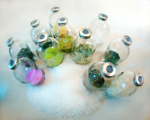
The negative image of plastic persists and is not getting any better in the face of the ongoing debate about microplastics which are basically everywhere. Plastic pollutes the environment. The globe is littered with huge quantities. We have to modify the production and utilisation of macroplastics as well as fundamentally rethink the way we dispose of them. ‘Out of sight, out of mind’ mentality must become a thing of the past.
https://www.biooekonomie-bw.de/en/articles/dossiers/waste-valuable-resource-wrong-place
-
-
Article - 21/10/2019
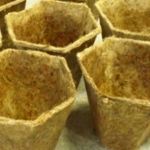
Plastic plant pots are not good for the environment; strictly speaking, they should not even be disposed of in recycling bins. Alternatives such as coconut fibre pots are compostable, but not pollutant-free and not "bio" at all. The Karlsruhe-based company Fiber Engineering has developed a truly ecofriendly way to grow plants: pots made of hemp or grass, which are preserved with biological components and decompose completely within a…
https://www.biooekonomie-bw.de/en/articles/news/pflanztoepfe-aus-naturfasern-bio-ohne-wenn-und-aber
-
-
Two-part interview part 2 | Prof. Dr. Ortwin Renn on the green genetic engineering debate - 26/08/2019
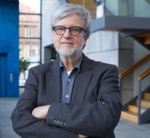
Many scientists are expecting revolutionary advances in research to come from new molecular biology tools such as the CRISPR/Cas gene scissors. These methods are very important for agriculture, especially plant breeding and nutrition. However, the debate on green genetic engineering 2.0 looks like it may once again be heading for ideological battles. We talked with Prof. Dr. Ortwin Renn and asked him about opportunities for better communication.
https://www.biooekonomie-bw.de/en/renn-green-genetic-engineering
-
Two-part interview part 1 | Prof. Dr. Regina Birner on the green genetic engineering debate - 12/08/2019

Green genetic engineering continues to divide opinion in Germany in the same way as CRISPR/Cas and other genome editing (GE) techniques. What are the consequences for the bioeconomy, which involves key areas of biotechnology? We talked with Prof. Dr. Regina Birner, agricultural economist and head of Hohenheim University’s Department of Social and Institutional Change in Agricultural Development at the Institute of Agricultural and Social…
https://www.biooekonomie-bw.de/agricultural-economist-birner-calls-for-other-forms-of-dialogue-besides-organized-interest-groups
-
Article - 01/08/2019
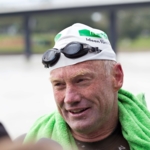
He swam the entire length of the River Rhine to draw attention to the contamination of rivers and oceans with plastic waste. After completing his mammoth swim, Prof. Dr. Andreas Fath decided to kill two birds with one stone and do something useful with microplastics. At the Furtwangen University of Applied Sciences campus in Villingen-Schwenningen, Fath is working on a filter system made of plastic waste that can be used to remove pollutants from…
https://www.biooekonomie-bw.de/en/articles/news/Clean-water-thanks-to-microplastics
-
-
-
-
Dossier - 15/04/2019
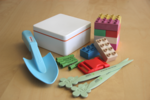
Plastic waste takes years to decompose and pollutes the environment. Nevertheless, plastics are an indispensable part of everyday life. It is therefore all the more important to find a meaningful alternative that is sustainable, environmentally friendly and has better properties and more functionality than conventional plastics. In addition, such an alternative should not be dependent in any way on fossil resources.
https://www.biooekonomie-bw.de/en/articles/dossiers/the-alternative-bioplastics
-
Article - 02/04/2019
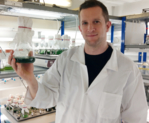
For many decades, glyphosate has been a common component of agricultural pesticides worldwide, although it is a controversial herbicide that may be harmful. The good news is that a more sustainable alternative is now in sight: researchers from the University of Tübingen have discovered a sugar molecule called 7-deoxy-sedoheptulose (7dSh) which inhibits the growth of plants and microorganisms, but appears to be completely harmless to human cells.
https://www.biooekonomie-bw.de/en/articles/news/simple-sugar-could-soon-compete-with-glyphosate
-
Article - 27/03/2019
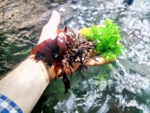
Algae are frugal organisms. They require only light, water, minerals and carbon dioxide to be able to produce biomass. These properties will now be exploited economically in a two-year research project. Dr. Stefan Sebök from the University of Hamburg plans to study the holistic utilisation of degradation products of a biogas plant in Wallerstädten by linking them to land-based algae cultivation.
https://www.biooekonomie-bw.de/en/articles/news/residues-from-biogas-plants-as-feed-for-algae
Website address: https://www.biooekonomie-bw.de/en/search











